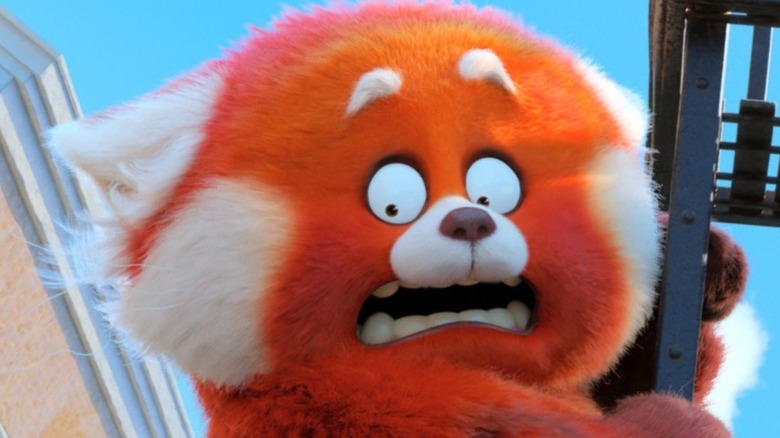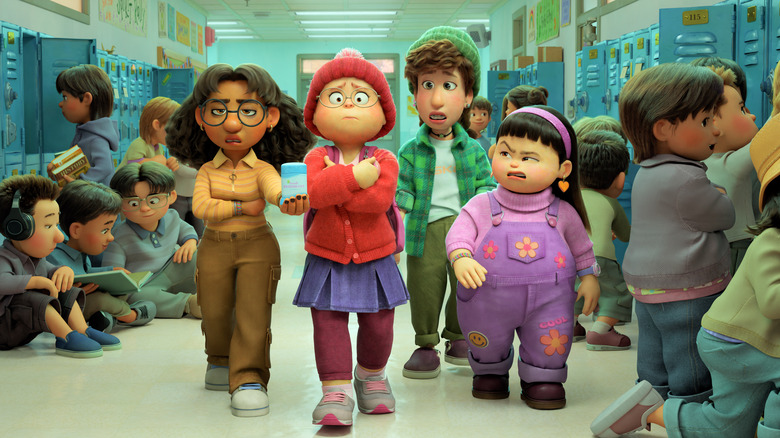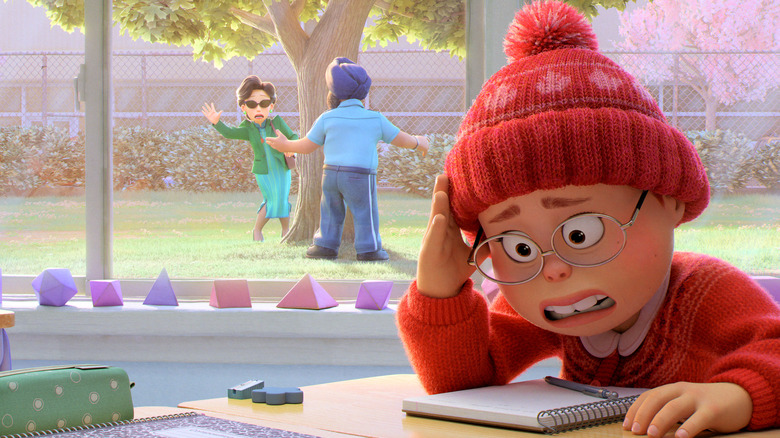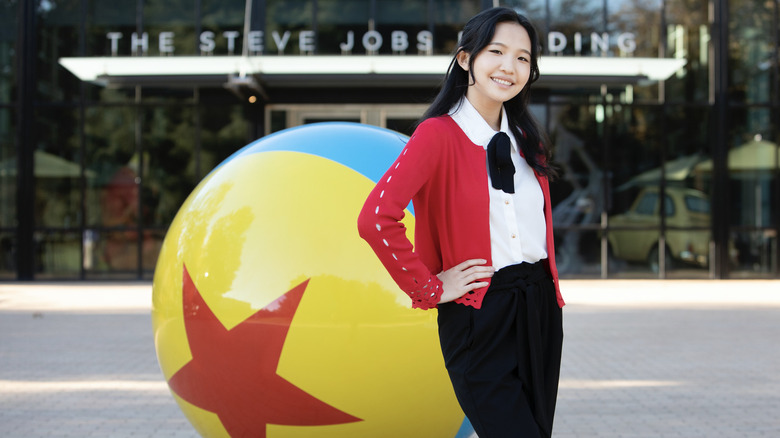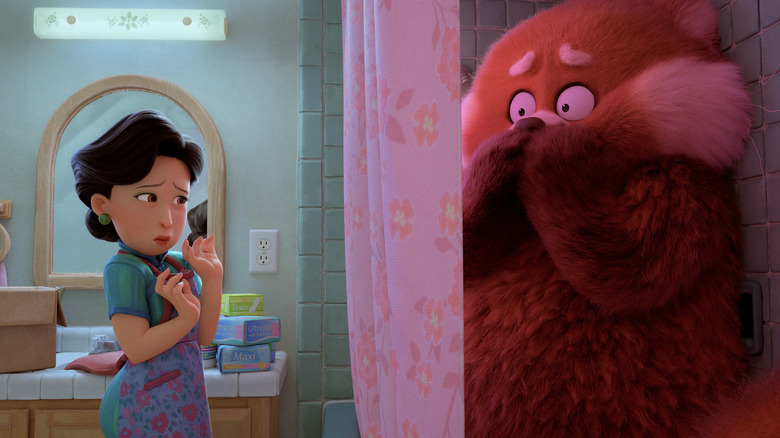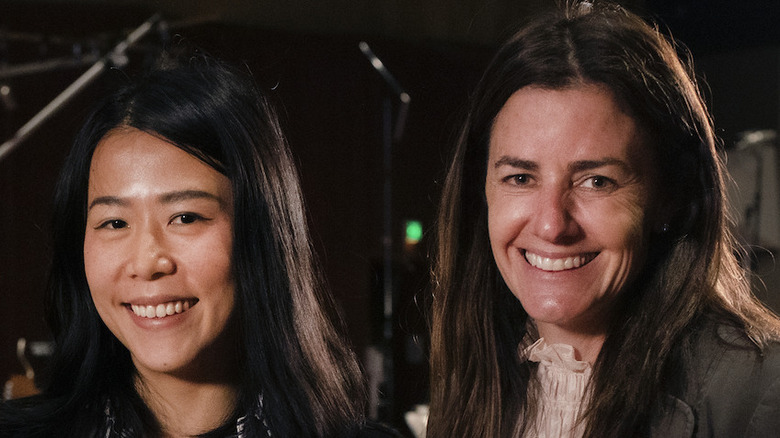Pixar's Domee Shi And Lindsey Collins Bring Awkward Life To Turning Red - Exclusive Interview
Disney and Pixar's latest offering, "Turning Red," arrives exclusively on Disney+ on March 11, and viewers are in for a treat. "Turning Red" follows 13-year-old Mei Lee, a slightly awkward but endlessly relatable teenager with a close group of besties, an overbearing mom, and an obsession with the latest boy band. The only problem is, Mei starts turning into a giant red panda whenever she gets overexcited. Hijinks obviously ensue.
"Turning Red" is directed by Domee Shi, who was also at the helm for the 2018 short film "Bao." Shi wanted to bring her own experiences as an Asian Canadian immigrant, making "Turning Red" an important moment for Asian representation on screen. Producer Lindsey Collins was also a driving force on "Turning Red," helping Shi bring her exciting vision to life.
Looper caught up with Shi and Collins in an exclusive interview ahead of the release of Pixar and Disney's "Turning Red" to find out what it was like working with Sandra Oh and how they developed the animation during the pandemic.
Creating an 'Asian tween fever dream'
"Turning Red" is a huge moment for Asian representation in a Pixar film, and I love that you call it an "Asian tween fever dream." That was such a great tagline. How important was it to tell this story, and what elements did you want to include specifically?
Domee Shi: I've had a lot of responsibility in telling this story, but also a lot of excitement too. I feel like films, they open you up and introduce the audience into a world, sometimes that they don't know much about. This is my opportunity to introduce non-Asian audiences to the very specific life of this quirky, 13-year-old Chinese Canadian girl.
With this movie, we really wanted to touch on this universal theme of growing up and dealing with changes in your body and your relationship with your mom and your friends, but tell it in a culturally specific way, which makes it unique and memorable and interesting. You can see that in all of the details of Mei's family temple, of her household, of her everyday life with her mom, making dumplings and watching soap operas on TV.
That was one of my personal favorite scenes, because it's so mundane, but also very cool to kind of show people that "This is the day to day." You see her dad in the background, cooking in the kitchen, which is ... That's normal in a lot of Chinese households. The dads cook as much as the moms do, and that was a really cool detail that we were able to include in the movie. I think with this movie, hopefully we can redefine what a universal story looks like and what kinds of characters can be in universal stories and that people of all backgrounds can relate to it in some way.
Lindsey Collins: Yeah, everything Domee said. She brought such a specificity of character to this film and did from the very first pitch. There was a real charm and desire for us to let her show this movie or show these characters in a way, because they were so specific and unique. It was [also] the fact that we were going to tell a very bold and unapologetic story about growing up as a tween girl and all that entails.
It was so great to have it grounded in this specificity of character. It didn't feel like we were being overly simplistic or stereotypical in our portrayal of these girls and her mom. There was something really lovely about the specificity of the cultural kind of representation and of Domee's personal story, as we tried to show this very different and in-your-face portrayal of going through puberty and going [through it] and all the messiness that entails. It really worked.
Exploring a '90s childhood
Domee, you incorporated some anecdotes from your own life into "Turning Red," like your mom hiding behind a bush with sunglasses on, spying on you. What was it like seeing those real life moments come to life on the screen?
Shi: Oh, first it was horrifying to relive those memories, but then it's very ... It's almost therapeutic. Now I can laugh at it because enough time has passed, and it adds this other level of uniqueness and authenticity to the movie, which is super awesome. It was definitely a rollercoaster of emotion, going through in my memories, all of the moments when I've ever been horribly embarrassed or stressed out, but that's what makes a good movie.
I love all the '90s nostalgia. I think it's such a good time to reflect on all those cool little details about Tamagotchis and diaries and things like that. People are going to love it.
Shi: Yeah, I love putting in all those details. I remember specifically having a little Tamagotchi kind of similar to Mei's, but I think I killed it every other day by accident.
Casting an unknown
Rosalie Chiang plays the main character, Mei, and she's an unknown actor. Did you have any resistance to casting her, or was it a straightforward decision, as she was the best person for this job?
Collins: We had no resistance. The best part is that because she had been living in our temporary reels for, oh gosh, about a year and a half, I think, every time we screened it, we'd get comments from people here, like, "Oh my gosh, whoever you had doing your voice is so cute. I love her. She's so charming. She's so good."
If nothing else, I think we would've had a riot if we had recast her. People would've been like, "Boo. Why would you take away this amazing girl?" Everybody fell in love with Rosalie over the course of the year and a half that she was doing all the work with us and our temp reels. It was a natural choice.
Shi: Yeah. I fell in love with the quality of her voice from the very first audition that we heard from her. I loved how imperfect it sounded, and at that time, she had a little bit of a lisp, too. It felt so dorky and unique and perfect and so Mei, that it felt like it was always her.
Collins: I feel like you can always tell when the animators love animating to a voice, because they'll do tests to early voices and stuff like that. Yyou get a sense from them very quickly, how much fun they can have and how much specificity they'll get in the performance based off of the read that the actor gives. It also helps reinforce the decision when you're looking at tests and they're having so much fun with the little quirkiness in her voice. It makes it all that much easier to make the choice.
Sandra Oh explored Ming's 'vulnerability'
What was it like working with Sandra Oh on "Turning Red"?
Shi: Oh, man, Sandra's awesome, and she brought so much to the character of Ming. We knew casting Ming was going to be tricky because the character is so complex. She has to have a huge range. She needs to be sharp and in-your-face, commanding in one scene and then flip a switch and be very genuinely loving and protective of her daughter in another scene. She's funny and paranoid and kooky at the same time.
Sandra was able to bring all of that and more to the character. What we loved about her performance was that she gave Ming vulnerability and believability, that even when Ming is snapping at Mei, that we still feel that it comes from a place of love and wanting to protect her daughter. Even when she goes really, really crazy, there's still that underlying feeling of love in there. That was all Sandra. Also, she's Canadian too, which was pretty awesome to be able to work with a fellow Canadian Asian.
An all-female leadership team
You had an all female leadership team on this. How did that influence the movie?
Collins: I don't know if we would've even been able to anticipate it or call it out necessarily, but ... it encouraged us to be bold in the storytelling. The creative conversations about the movie were always really bold and funny and very real in terms of experience, our own personal experiences and what we thought was funny, or ... what felt genuine, or what felt right to how to portray these girls on screen.
Because it's such a collective [effort] making these movies, you can find mistakes, or talk yourselves out of these choices sometimes, and these bolder ways of telling the story, just because you have people [saying], "Well, I don't know," or maybe second guessing you at times, or making you be like, "I don't know, should I do that? Is it too much?"
When you have a group of people who are having a similar experience or shared experience and are right there to be like, "Oh my gosh, yes, that totally happened to me," or "That's so funny. I love that," or "Yeah, I totally buy that she would say that," or that [a mother] would react that way in the moment, it allowed us to really stay true to that. As a result, you got a lot of that on the screen at the end, which is a huge, huge win.
"Turning Red" is streaming exclusively on Disney+ starting March 11, 2022.
